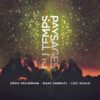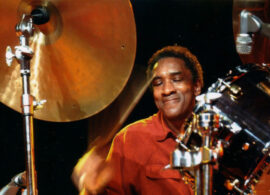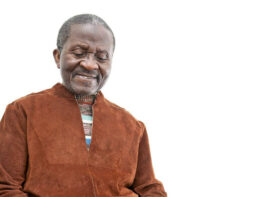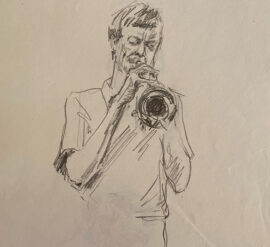
Sax player Joe Rosenberg is a musical nomad. He splits his time between his homes in Paris, France and Bali, Indonesia, well-versed in the legacy free jazz forms on both sides of the Atlantic, as well as in traditional-classical Hindustani, Balinese and African musical schools. All are explored in his new album, «Rituals and Legends».
This album feature Rosenberg, playing soprano sax, leading a group of French musicians, a core quintet of tenor and soprano sax player Daniel Erdmann and the rhythm section that accompanied Rosenberg on his «Resolution» album (Quark, 2014) – pianist Bruno Angelini, bass player Arnault Cuisinier and drummer Edward Perraud. This quintet is augmented by four sax players on different compositions.
«Rituals And Legends» offer four original compositions, all are abstractions-transformations of classical musical forms from India, Burundi and Bali, but following Cecil Taylor remark that «tradition is not necessarily a prison». The first one is «Ramkali», later revised also in an alternate version, titled after a gentle morning Indian raga and adopted from the devotional performance of the late vocal master Bhimsen Gururaj Joshi. The quintet plays it in a peaceful and reverent manner as jazz ballad, highlighted by a moving lyrical solo of Rosenberg that captures the meditative essence of this raga. The second piece, «Akazehe», based on a Burundian greeting gesture, is a rhythmic piece. The piano of Angelini leads a simple dance form and the soprano sax of Rosenberg, the tenor sax of Erdeman and the alto sax of Stéphane Payen serve as a choir that answer and elaborate on Angelini dance moves.
The most impressive piece is the arrangement of the classical Indian rhythmic cycle, «Teen Taal», based on 16 beats and known as the king of taal-s (rhythms), the most common rhythm used in classical Indian music. Rosenberg arranged the virtuoso tabla duel of father and son, masters Ustad Alla Rakha and Zakir Hussain, for a sax quartet – himself and Erdman play the Rakha part and baritone sax player Olivier Py and alto sax player Stéphane Payen play the Hussain part, all transforming it into a playful, Bebopish swinging duel. The fourth piece «Kecak» is based on a form of of Balinese dramatic dance, usually performed by men. Now the Ensemble is expanded to a choir of six sax player with the addition of alto sax player Anotnin-Tri Hoang and tenor sax player Robin Fincker, all exploring patiently the gentle gamelan moves through an emphatic improvised interplay.
Impressive compositions that reaffirm the inclusive, open essence of of jazz as an art that keeps developing.
Eyal Harauveni
Joe Rosenberg (ss); Daniel Erdmann (ts, ss); Stéphane Payen (as, 2,3,4); Olivier Py (bs, 3,4); Robin Fincker (ts, 4); Antonin-Tri Hoang (as, 4); Bruno Angelini (p); Arnault Cuisinier (b); Edward Perraud (dr)



































